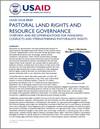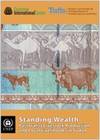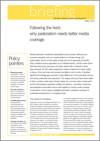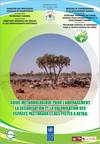This briefing paper argues that the erosion of pastoral resource entitlements was hardly a topic for discussion in the early 1980s, but it is the single most critical impediment to contemporary pastoral development. Despite progress on many other fronts, pastoral land rights are under pressure as never before, and the issues of resource governance discussed in this brief are at the crux of the future of pastoral peoples.
The paper presents a comprehensive summary of current challenges to pastoral land rights and resource governance in developing countries. Further, it makes recommendations for managing conflicts and strengthening pastoralists’ rights, and explores the potential role of USAID in addressing these issues.
Year of publication: 2013Organization: الوكالة الأمريكية للتنمية الدولية
Topic: صراع, نوع الملكية, مرونة
Language: English
Type of document: تقني
Geographical coverage: أمريكا اللاتينية, الشرق الاوسط, شمال أفريقيا, غربية افريقيا, أفريقيا الوسطى, شرق أفريقيا, جنوب أفريقيا, آسيا الوسطى, جنوب آسيا
This research analyses the conflict situation in Karamoja, Uganda. Its findings are based on community meetings in Moroto and Kaabong Districts, interviews with peace actors, stakeholders, partner organizations, field visits, trainings and literature research. It gives recommendations for conflict sensitive programming and sustainable peace interventions.
Year of publication: 2013Organization:
Topic: صراع
Language: English
Type of document: علمي
Geographical coverage: شرق أفريقيا
This report highlights the importance of pastoralist livestock production for the Sudan's economy, and outlines ways in which pastoralism can be supported in the future. The economic value of pastoral livestock production is largely hidden, both in the official statistics, and in relation to the domestic market and subsistence economy (e.g. milk). The report argues for an informed, effective and equitable integration of pastoral systems within national policy and legal frameworks, in order to legitimize this form of land use and to underpin a more constructive approach to modernization of the livestock sector. The findings indicate that unleashing the potential of the livestock sector in Sudan requires securing the conditions for livestock mobility, so that livestock can access pastures selectively, when the nutritional value of plants is at their peak. This requires the return of security in pastoral areas and along livestock routes, and a regulation of markets in land (in pastoral areas), water for livestock, and crop residues.
Year of publication: 2013Organization:
Topic: اقتصاد, نوع الملكية, القيمة المضافة
Language: English
Type of document: تقني, علمي
Geographical coverage: شرق أفريقيا
See how members of arbale pastoral field school in Borana Zone, Southern Ethiopia are applying knowledge gained to implementing community managed disaster risk reduction action plans for the protection of vast areas of communal grazing lands.
Year of publication: 2013Organization: منظمة الأغذية والزراعة للأمم المتحدة
Topic: منظمة, خدمات اجتماعية
Language: English
Type of document: فيديو
Geographical coverage: شرق أفريقيا
Mobile pastoralism contributes substantially to food security, livelihoods and economic prosperity, and can increase resilience to climate change; but policymakers, donors and the public at large tend not to appreciate its benefits.
Policy narratives portray pastoralism as an outdated practice, and the media stories that help shape policy processes and public opinion often contribute to these false portrayals. An IIED study analysed the content of stories from media outlets in Kenya, China and India, and surveyed journalists in each country. It identified significant knowledge gaps and inter-country differences in how journalists perceive and portray pastoralists and pastoralism. The analysis also found that media outlets in these countries under-report climate change, the economic value of pastoralism and the links between pastoralist mobility and resilience.
Journalists, researchers and pastoralist communities need to work together to improve media coverage of pastoralism, and by doing so highlight pastoralism’s potential contribution to sustainable development in a changing climate.
Organization: المعهد الدولى للبيئة والتنمية
Topic: تغير المناخ, القيمة المضافة
Language: English
Type of document: تقني, السياسات والتشريعات
Geographical coverage: مناطق العالم
The global narratives that have dominated agricultural policy are built on crisis scenarios around meeting projected food demand, now complicated by global climate change and food price spikes. The role given to drylands and pastoralism in these narratives shows little consistency, except for characterising them as lacking in some way, for example: unproductive, resource scarce, fragile, marginal, remote, using resources that are uninteresting for other uses.
A closer look reveals pastoralism’s many positives. The increasing recognition that pastoralist systems in the drylands can work with environmental variability, rather than against it, opens up an alternative storyline for global food security under climate change.
Organization: المعهد الدولى للبيئة والتنمية
Topic: اقتصاد
Language: English
Type of document: تقني, السياسات والتشريعات
Geographical coverage: مناطق العالم
يدعوا إعلان إنجامينا الذي تبناه الوزراء المعنيون بالثروة الحيوانية والأمن في عدد من دول أفريقيا مجتمعات منطقة الساحل وغرب أفريقيا ووسطها وشمالها والمجتمع الدولي إلى التوحد بروحٍ من السلام والتسامح والتعاضض للترويج للسلام والتنمية المستدامة في مناطق الصحارى والساحل إذ أن دعم الرعاة يمكن له وحده أن يحافظ على استقرار المنطقة.
Year of publication: 2013Organization: كتاب مستقلون
Topic: مشاركة
Language: العربية, English, Français
Type of document: السياسات والتشريعات
Geographical coverage: غربية افريقيا, أفريقيا الوسطى, شرق أفريقيا
Le présent guide vise à contribuer à la mise en œuvre réussie des programmes définis par la Politique Nationale de Développement durable de l'Elevage (PNDEL) et notamment le Programme de sécurisation des zones d'intensification des productions animales.
De manière spécifique, le guide méthodologique ambitionne de mettre à la disposition des acteurs un outil opérationnel de réalisation et de gestion durable des zones pastorales et des pistes à bétail en suivant un processus approprié dans la conduite des opérations d'identification, d'aménagement, de sécurisation et de valorisation des espaces pastoraux et des pistes à bétail.
Ces objectifs sont déclinés en quatre (4) grands axes : l’identification des zones pastorales et des pistes à bétail ; l'aménagement des zones pastorales ; la sécurisation des zones pastorales et des pistes à bétail ; et la valorisation des zones pastorales et des pistes à bétail.
Par ailleurs, la stratégie de mise en œuvre du guide traite successivement des principes de la mise en œuvre, de la diffusion du guide et de la formation des utilisateurs, du financement, du suivi-évaluation et formule des recommandations.
Year of publication: 2013Organization: كتاب مستقلون, برنامج الأمم المتحدة الإنمائي (UNDP)
Topic: اقتصاد, الخدمات البيئية, مرونة
Language: Français
Type of document: تقني
Geographical coverage: غربية افريقيا









